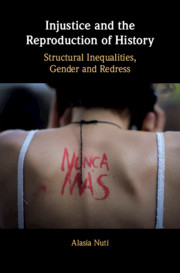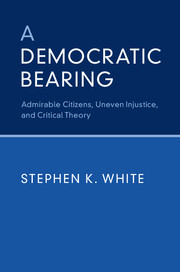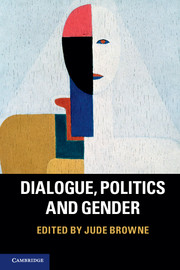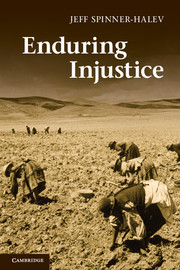Injustice and the Reproduction of History
Demands for redress of historical injustice are a crucial component of contemporary struggles for social and transnational justice. However, understanding when and why an unjust history matters for considerations of justice in the present is not straightforward. Alasia Nuti develops a normative framework to identify which historical injustices we should be concerned about, to conceptualise the relation between persistence and change and, thus, conceive of history as newly reproduced. Focusing on the condition of women in formally egalitarian societies, the book shows that history is important to theorise the injustice of gender inequalities and devise transformative remedies. Engaging with the activist politics of the unjust past, Nuti also demonstrates that the reproduction of an unjust history is dynamic, complex and unsettling. It generates both historical and contemporary responsibilities for redress and questions precisely those features of our order that we take for granted.
- Advances a normative framework to understand when and why historical injustice matters
- Defends a theory of historical justice while not dismissing that many changes occurred since past wrongs were committed
- Engages with many literatures and fields, including normative political theory, gender studies, critical race theory and public policy
Awards
Honourable Mention, 2021 ECPR Book Prize in Political Theory, European Consortium for Political Research
Reviews & endorsements
'This is a major contribution to our thinking about historical injustice, and especially innovative in taking the position of women as a paradigmatic example. By putting gender at the centre of her analysis, Nuti is able to make compelling new arguments about the normative significance of the unjust past.' Anne Phillips, author of The Politics of the Human
'Arguing that discussions about historical injustice wrongly conceptualises history, Alasia Nuti reframes the debate by developing a structural account of history. This new account of history, alongside a focus on women, allows us to see historical injustices in new and important ways. This is a provocative and insightful book that is a major contribution to the literature on historical injustice.' Jeff Spinner-Halev, Kenan Professor of Political Science, University of North Carolina, Chapel Hill
'In this path-breaking book, Alasia Nuti develops a new way to combine reflections on historical and structural injustice. Taking us beyond reified notions of time, agency or social groups, she suggests a powerful account of political and social justice that speaks to the past, the present and the future.' Rainer Forst, Johann Wolfgang Goethe-Universität Frankfurt am Main
Product details
March 2019Hardback
9781108419949
238 pages
235 × 158 × 16 mm
0.47kg
2 b/w illus.
Available
Table of Contents
- 1. Introduction
- 2. De-temporalising (historical) injustice
- 3. The structural reproduction of unjust history
- 4. History, injustice and groups
- 5. Defining women as a group
- 6. Women and the reproduction of unjust history in egalitarian contexts
- 7. The policy of the unjust past
- 8. The politics of the unjust past
- 9. Conclusion: responsibility and the process of redress
- References
- Index.









